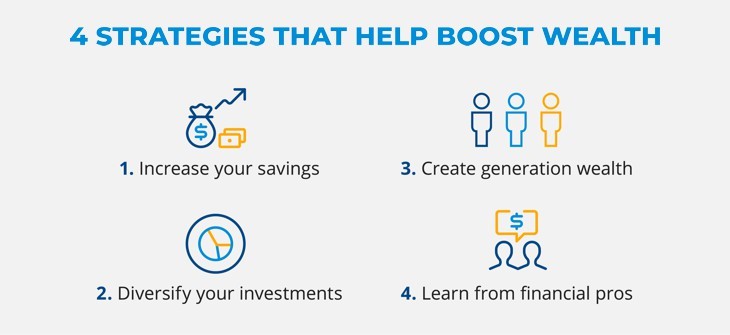This website or its third-party tools use cookies, which are necessary to its functioning and are required to achieve the purposes illustrated in our online privacy policy.
Build your wealth by incorporating these strategies into your financial plan.

You’ve worked hard to achieve financial success and build your income, but do you know how to build your wealth? Try this exercise: Add up the total financial value of all your assets (your wealth), then subtract the total amount of your debt. The result is your net worth. The bigger that number is, the more financial resources you have available. That’s why making the transition from high earner to wealth builder is so important.
Wealth isn’t just the money the very rich spend on mansions and yachts. It’s the way your long-term financial goals become possible to achieve. Those goals may include saving enough money to last through retirement, becoming financially independent, passing something on to the next generation, or giving back to your community.
The key to help you build wealth is to incorporate these four strategies into your financial plan.

Increase Your Savings
Finding ways to keep more of what you earn is an essential step toward making the transition from high earner to wealth builder. Here’s how:
- Tackle your debt, including credit card accounts and student loans.
- Track your expenses and look for ways to cut out unnecessary spending and how to save for the things you need and want.
- Allocate the extra money from cutting your debt and spending to saving and investing.
- Calculate how much you will need in retirement so you can set a savings target (see calculator further down on this page).
- Increase your retirement plan contributions, including making catch-up contributions if you are 50 or older 1.
Diversify Your Investments
We all have varying levels of confidence when it comes to investing. Your personality, investing experience, risk tolerance, family history and other factors can affect your comfort level.
Wherever you’re starting from, these investment strategies are essential for building wealth:
- Diversify your portfolio by putting your money in a variety of investment types to hedge against one or more of them having a slump at any given time.
- Pick the right mix of investments at the right time. Generally, the younger you are, the more money you can put in riskier investments because you have more time to recover from downturns.
- Invest in more than your retirement account once you’ve maxed out your retirement plan contributions.
- Include investments that provide equity and cash flow, which can include your own home as well as rental property.
Work Toward Creating Generational Wealth
If one of your goals is to pass on some assets to the next generation of your family, you need to make plans for how your money is spent now and after you pass away. Those steps can include:
- Creating an estate plan, which is the most common way to transfer generational wealth. Work with an estate attorney to make sure your will and other key estate planning documents are in order.
- Owning a home, as it will likely be the most valuable asset you have to pass on to your heirs.
- Having life insurance, which can be another important option to pass along some of your wealth to family members.
- Owning an annuity, which includes beneficiary benefits that can help you control how and when assets are distributed and help your loved ones avoid the complicated probate process.
You also can share some of your wealth while you’re still living. This can take several forms (in each case, be aware of restrictions and the tax implications):
- Gift money to a family member to help out with a down payment on a home or provide startup funding for a business, for example.
- Provide educational assistance by creating a savings fund for a grandchild’s college education or making a tuition payment directly to their school.
- Pay for medical expenses for a family member directly to a health care provider.
- Own a family business that you can pass on to the next generation.
Learn Wealth-Building Tips from Financial Pros
Consult with a financial professional. They can help you navigate some of the more complex portions of your wealth-building strategy and keep you from veering off track.
Reading books and taking courses in subjects like investing and entrepreneurship are additional ways to boost your wealth-creating savvy.
Even when your work pays well, you can’t rely on your income alone to generate wealth. Building the wealth you need to fund your long-term goals requires smart planning about how to strategically save and spend your money.
READ MORE

Retirement Planning
Talking Social Security With Mary Beth Franklin
Staying aware of current regulations set by the Social Security Administration can help retirees receive the full benefits they deserve.

Retirement Planning / Family
How Annuities Can Boost Your Retirement Savings
The tax-deferred growth potential of an annuity can boost your savings for the future.

Retirement Planning / Family
How to Enhance Your Retirement Strategy with Cash Value Life Insurance
Your retirement strategy should begin with a tax-advantaged retirement account, but it doesn't have to end there. Supplementing your 401(k) or IRA with cash value life insurance can help give you greater financial flexibility during your lifetime while providing protection to your loved ones.

Family / Estate Planning
What Blended Families Should Know About Estate Planning
An estate plan with an Irrevocable Life Insurance Trust may help reduce estate taxes and ensure equitable distribution of a blended family’s assets.

Family / Estate Planning
Ensuring a Smooth Transition for Your Family Business
A plan that includes life insurance can help provide liquidity and equality in a family business succession.

Home / Estate Planning
How to Help Protect Your Estate Plan from an Uncertain Future
A life insurance trust can help provide flexibility and protection for the future.

Family / Estate Planning
Estate Planning for Unmarried Couples
Life insurance can help maximize wealth transfer for unmarried couples.

Family / Estate Planning
5 Ways Life Insurance Can Help With Estate Planning
As you develop or update an estate plan, considering the following ways life insurance can help address your needs.

Career And Business
Retirement Savings Options at a New Job
Weigh your choices before deciding where—or whether—to move your retirement savings when you switch employers.

Retirement Planning
Ways to Retire Confidently
If you’re concerned about saving enough for retirement, a protected source of income can help put your mind at ease.

Retirement Planning / Home
Don’t Put Off Saving for Retirement
Start building your nest egg early to prepare for the unexpected.

Retirement Planning / Family
Managing Your Beneficiaries’ Inheritance
An annuity with a predetermined beneficiary payout option can offer greater control without a trust.

Retirement Planning
How to Save on Charitable Giving During Retirement
Qualified charitable distributions can help with tax savings and at the same time give to charity during retirement.

Retirement Planning
Picking the Right Type of IRA for You
Understanding the difference between a traditional and Roth IRA can go a long way in planning your retirement savings strategy.

Estate Planning / Family
How to Cope Without the Family Breadwinner
Take these steps to help your loved ones prepare financially in the event the worst happens to you.

Career And Business / Family
A Smart Way for Philanthropists to Give More
A well-designed charitable remainder trust can help lower taxes and aid in financial planning.

Retirement Planning
The Challenges of Living Longer
The good news: Retirees are living longer. The bad news: That may mean retirees will have to fund more years of retirement.

Retirement Planning
Make the Most of Your Retirement With an Informed Income Strategy
Annuities offer another way to put a floor under your retirement income, providing an retirement income stream in exchange for an initial investment. Immediate annuities begin issuing payments soon after you make your investment, while deferred annuities are invested for a period of time before you start taking withdrawals. You can also choose between fixed (-rate) and variable annuities. Fixed annuities earn a guaranteed interest rate over time, while variable annuities are tied to the performance of an investment portfolio. Both provide monthly income for life and protection for your loved ones through a death benefit.

Estate Planning / Family
Finding a Way to Hand Over a Family Business
Creating a detailed succession plan is paramount for a smooth and profitable transition.

Family / Retirement Planning
Balancing the Care of Aging Parents and Children
There are ways to ease the burden of this high-stress juggling act.

Retirement Planning
Deciding When to Claim Retirement Benefits
Keys to Optimizing Social Security Income.

Home
How Tax Reform Impacts Retirement and Estate Planning
The new tax law will alter many decisions you may have to make when filing your 2018 taxes.

Retirement Planning
The Importance of Investment Diversification
Methodically placing assets in several baskets isn’t as thrilling, but helps you invest responsibly.

Estate Planning / Family
Protect Your Loved Ones With an Estate Plan
Taking a proactive approach to passing on your assets can help bring peace of mind to you and your family.

Retirement Planning / Home
Choosing a Financial Professional
When searching for the right financial professional for you, start with these 7 questions.

Retirement Planning / Family
Four Ways to Access the Value of a Life Insurance Policy
Life insurance isn’t only for your survivors: Find out how to use its cash value during your lifetime.

Retirement Planning
Women & Finances: Securing Your Retirement
Strategies to help make sure your retirement savings last for life.

Retirement Planning / Family
Women & Finances: Strengthening Your Finances After Divorce
Make sure your retirement plan is still on track.

Family / Home
Women & Finances: Moving Beyond the Loss
The loss of a significant other can offer an opportunity to learn about financial empowerment.

Retirement Planning
Weathering a Turbulent Market
Worried investors would do well to remember that historically, markets recover after a downturn.

Family / Home
The Surprising Affordability of Term Life Insurance
A life insurance policy isn’t as expensive as you think.

Family / Home
Get the Most Out of Your Annual Financial Check-Up
A yearly financial review is a good way to stay fiscally healthy.

Retirement Planning / Family
How to Buy an Annuity
Choose the right annuity plan that aligns with your financial goals.

Family / Home
6 Life Insurance Myths Debunked
Don’t let these common misconceptions prevent you from giving your family the protection they deserve.

Healthcare / Family
Planning for the Cost of Healthcare in Retirement
Trying to anticipate what you’ll spend on healthcare in retirement can seem daunting, but estimates can help you start preparing for the future.

Family / Home
The Benefits of Rethinking Work-Life Balance Before Retirement
Achieving better work-life balance now can help position you for a more fulfilling future.

Family / Estate Planning
How to Buy Life Insurance
These four steps can help you choose the best protection for you and your family.

Retirement Planning / Family
How to Lower Your Taxes in Retirement
You’ve worked hard to build your retirement savings. Now, make sure your money lasts by considering strategies to lower taxes.

Home / Family
The Importance of Financial Literacy
Learn about basic concepts regarding financial literacy: budgeting, saving, debt/spending, and financial management.

Retirement Planning / Family
Make the Most of Your Money with a Financial Plan
A financial plan can help you meet your needs today and reach your long-term goals.

Family / Home
Money Moves to Help You Feel More Confident
Build a stronger financial foundation with these four steps.

Family / Home
Supporting Multiple Generations
Tips for families with many generations living together so everyone stays financially healthy.

Family / Estate Planning
Securing Your Family’s Future
Having an estate plan is essential to maintaining your family’s financial security.

Retirement Planning / Family
4 Ways to Help Turn Income Into Wealth
Build your wealth by incorporating these strategies into your financial plan.

Career And Business
Why Employee Benefits Matter
The key to attracting top talent goes beyond trendy perks.

Retirement Planning / Family
How Much Life Insurance Do I Need?
These key factors can help you figure out your life insurance sweet spot.
1 The 50+ catch-up contribution is available under Internal Revenue Code (IRC) Section 414(v) for individuals at least 50 years old in 2021 and who make eligible contributions to 401(k), 403(b), and/or governmental 457 plans.
In order to sell life insurance, a financial professional must be a properly licensed and appointed life insurance producer.
The above is provided for informational purposes only and should not be construed as investment, tax, or legal advice. Information is based on current laws, which are subject to change at any time. You should consult with your accounting or tax professional for guidance regarding your specific financial situation.
Pacific Life refers to Pacific Life Insurance Company and its affiliates, including Pacific Life & Annuity Company. Insurance products are issued by Pacific Life Insurance Company in all states except New York and in New York by Pacific Life & Annuity Company. Product availability and features may vary by state. Each insurance company is solely responsible for the financial obligations accruing under the products it issues.
Pacific Life’s Home Office is located in Newport Beach, CA.
PL70
